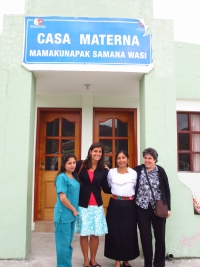February, 2013
On annual trips led by UMSN Clinical Instructor Megan Eagle, MSN, FNP-BC, nursing students visit the modern, capital city of Quito as well as residential communities. They gain new perspective on urban and rural disparities, as well as those between health care in Ecuador and in the United States.
“Working in Ecuador, I realize how much I take our electronic blood pressure cuffs, scales, and thermometers for granted,” says Emily McKenzie, a junior at University of Michigan School of Nursing. Without air conditioning at facilities in low-income neighborhoods, staff members leave windows and doors open to help with airflow--and in one neighborhood health center this also meant an occasional dog would walk through the clinic.
Dogs provide another part of the learning experience for the students. The neighborhood health centers pull double duty, functioning as both a health department as well as a primary care facility. While UMSN students were visiting, staff members were vaccinating neighborhood dogs. The students helped by registering the animals.
Healthy eating was a significant focus of the last trip. Using food from Ecuador, the students adapted a version of MyPlate, the U.S. government initiative to encourage Americans to fill half their plates with fruits and vegetables. Students also learned about a program giving community members, especially young children and expectant mothers, the resources to start their own vegetable gardens. “People’s health is profoundly determined by things that have nothing to do with a pill, prescription, a surgery, or a hospital,” said Eagle.
One surprise for the students was the lack of privacy in neighborhood health clinics.

However, the openness provided an unexpected opportunity for the students to learn in a different way. Even the students who spoke Spanish sometimes had difficulty following conversations, so they focused on body language. “I started studying the patients more,” said LSA senior Katie Lind. “Every patient seemed to be desperate to communicate and be understood. I now feel like patient care is about listening and giving the patients validity.”
While much of health care in Ecuador differs from standard American fare, the students saw areas of inspiration. “I think some aspects of the traditional birthing rooms could be applied to births in the United States,” said UMSN Second Career student Leah Assenmacher. “The use of herbs was fascinating, and it seems the laboring women get a lot of support. I was especially impressed when our guides told us that if the woman really wants it, the doctor or midwife will step back to allow the traditional midwife to catch the baby. The emphasis on what the woman wants is really refreshing.”
Eagle believes international experience for students can create a lasting impact on the way they practice in the future. She said, “Where pieces of infrastructure that prevents disease that we count on here, are missing, you see it more clearly. Once you see it, you’re able to come back and see that social causes of disease and health disparities are equally true here.”
 However, the openness provided an unexpected opportunity for the students to learn in a different way. Even the students who spoke Spanish sometimes had difficulty following conversations, so they focused on body language. “I started studying the patients more,” said LSA senior Katie Lind. “Every patient seemed to be desperate to communicate and be understood. I now feel like patient care is about listening and giving the patients validity.”
However, the openness provided an unexpected opportunity for the students to learn in a different way. Even the students who spoke Spanish sometimes had difficulty following conversations, so they focused on body language. “I started studying the patients more,” said LSA senior Katie Lind. “Every patient seemed to be desperate to communicate and be understood. I now feel like patient care is about listening and giving the patients validity.”




